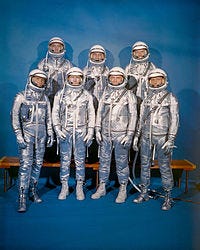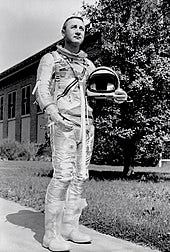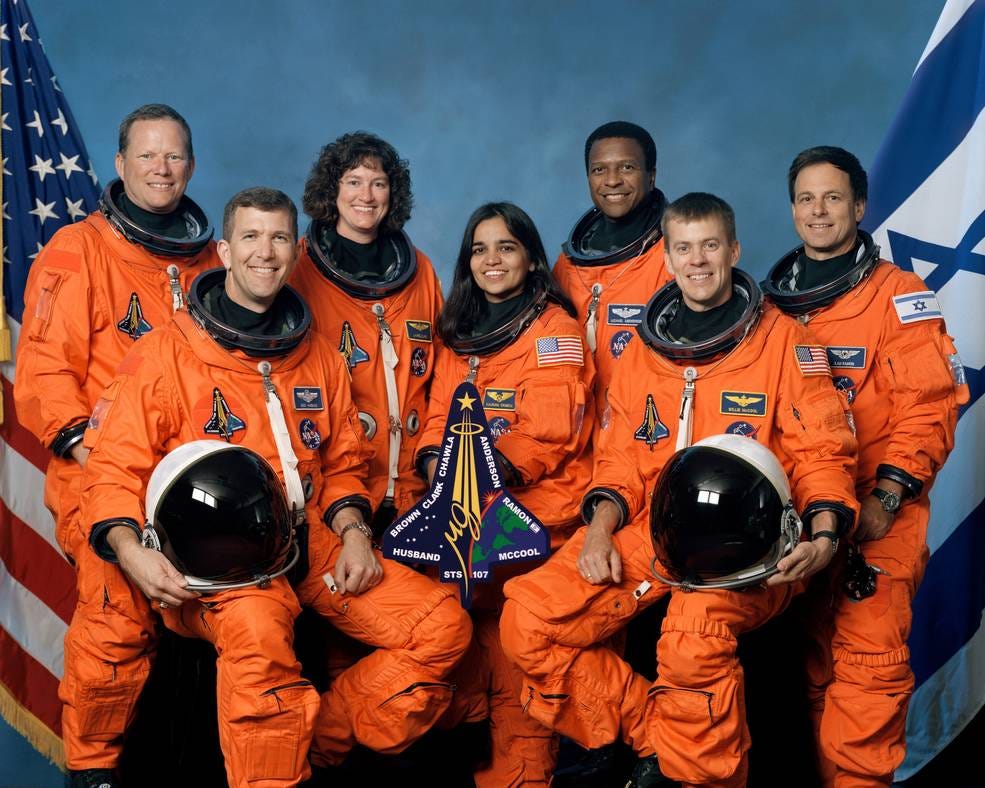To the stars … and time for a break to recharge the batteries …
My childhood fascination with astronauts -- and what lies beyond
I was just about to finish the sixth grade when NASA launched the first manned Mercury spacecraft with Alan Shepard aboard in May 1961, and I had already become fascinated by the whole thing. From age 10, I had followed the program with rapt attention, knew all the astronauts’ names, wrote off to NASA for photographs in seventh grade, thrilled at every new launch.
The Mercury 7 astronauts, my boyhood idols from NASA in 1961. Public domain photo
I was clearly no athlete, still hobbled a bit by childhood asthma—could barely walk a block without becoming winded. But these energetic guys were my idols—Alan Shepard, Gus Grissom, Deke Slayton, John Glenn, Scott Carpenter, Wally Schirra, and Gordon Cooper. They were my Daddy’s age, of course, but so vigorous, so daring! If I could never truly aspire to doing what they did, I could at least live vicariously through them.
All through high school, I followed the Mercury and Gemini programs, every launch, every wonderful moment, minor mishap, and eventual tragedy. I wept without shame when Gus Grissom died on the launch pad at Cape Canaveral in January 1967, along with fellow astronauts Ed White and Roger Chaffee, in that awful fire during a pre-launch test for Apollo I. Until then, Gus had led a charmed life, escaping drowning when his Liberty Bell 7 capsule landed in 1961; the capsule's emergency explosive bolts unexpectedly fired, blowing off the hatch. As it filled with water, he managed to escape through another exit and tread water until he could be rescued.
One of my heroes: Mercury, Gemini, and would-be Apollo astronaut Gus Grissom (1926-1967). Public domain photo
Like millions of Americans, I went on to watch the wonderful moon landing in July 1969—convinced that Neil Armstrong, Buzz Aldrin, and Michael Collins should consider running for president!—and only slightly gratified when John Glenn (1921-2016) finally made it as far as the U.S. Senate in 1974, a decade after he circled the earth in 1962. (He even went back into space aboard the Shuttle in 1998, at age 77.)
Three other astronauts have since been elected to Congress, including Mark Kelly, who now holds John McCain’s Arizona seat in the Senate; Apollo 13 commander Jack Swigert, who died before taking his seat in the U.S. House from Colorado; and moonwalker Harrison Schmitt, who served in the Senate from New Mexico, alongside Glenn. Others have come close. Other Americans seem to know astronauts for trustworthy heroes, almost instinctively …
Ex-astronaut John Glenn went to the Senate—and then, back into space at 77—after retiring from NASA. Public domain photo
I went to see the blockbuster movie, The Right Stuff, when I lived in Kingston, Jamaica, during my first Foreign Service tour abroad in 1983, and relived my wide-eyed childhood fascination on the big screen, Hollywood-style. What a wild ride that was!
Fittingly, my wife and I later gathered in a large crowd at the U.S. Embassy in our next posting, in Copenhagen, to watch the launch of the Challenger space shuttle in January 1986 on live TV—with its first teacher-in-space, Christa McAuliffe, aboard. Our collective cheers, of course, turned to horror when it exploded a minute later. All seven aboard died in a flash: commander Dick Scobee, pilot Michael Smith, mission specialists Ellison Onizuka, Judith Resnik, and Ronald McNair, and Hughes Aircraft engineer Gregory Jarvis.
The crew of the ill-fated shuttle Challenger, 1986. Photo courtesy Smithsonian Institution
After I left the Foreign Service in 1997, I finally made it to Cape Canaveral, just once, on a tour as part of a Mexico-to-mainland (Alexandria, Virginia!) sea cruise in 1998, to pay silent tribute to all those who had gone on into space—and never returned. There was no launch this time, no thrills, just reverence.
Fast forward another five years. I was now working for the GED Testing Service, as a special projects director, and making an obligatory appearance before Texas adult educators gathered in Austin, when I walked outside my hotel on Saturday, February 1, 2003, and noticed U.S. flags at half-staff. I had paid only passing attention to the launch of the Columbia shuttle mission just two weeks earlier. I was puzzled—but only momentarily—when I asked someone who had died, which former president.
The Columbia had suddenly disintegrated upon re-entry, literally over my head, on its final approach to Cape Canaveral, while I was in the shower that morning. Another seven heroes were now gone: commander Rick Husband; pilot William McCool; mission specialists Michael Anderson, David Brown, Kalpana Chawla, and Laurel Clark; and Israeli payload specialist Ilan Ramon.
The crew of the shuttle Columbia, just before its final doomed flight in 2003. Photo courtesy NASA
From my former home in Alexandria, Virginia, I was later able to watch occasional unmanned rocket launches from Wallops Island, not too far away. If I no longer fantasized about actually being aboard one—my occasional vertigo has long since made even climbing ladders a challenge—a small part of me remained perennially wistful, almost envious, ever proud of those who took the risk and went up—even if they did not always come back. They remained larger than life, forever young, in my mind.
It reminded me of the terrific, underrated, film October Sky, released in 1999, about an inventive kid named Homer Hickam, inspired by the launch of the Russian satellite Sputnik. And almost improbably, I recalled my childhood next-door neighbor Tommy Harrall, a budding engineer, and his friend Billy Henry, the soon-to-be scientist and doctor, who came up, as I recall, with their own rocket-launch idea in the 1960s. They were the hands-on do-ers. I was always just the hands-off observer …
The nearest I ever got to rockets or space travel and weightlessness was when I went flying, periodically, with my Foreign Service pal John Clarkson, a skilled pilot, bless his generous memory … who knew famous pilots-turned-Senators John McCain and John Glenn personally, and loved being up in the sky like few others I have ever known. And I learned to love it almost as much as John did.
As a kid, I once used to watch the closing 1 a.m. video-poem on a local TV station, showing an Air Force pilot above the clouds, ending with “… put out my hand, and touched the face of God.” (From “High Flight” by John Gillespie Magee, Jr., a teenaged U.S. volunteer pilot killed in Canadian RAF flight training in 1941: it begins “Oh! I have slipped the surly bonds of earth…”) Always gave me a chill. They don’t do that anymore, since local stations so rarely bother to sign off at all. A shame …
* * * * * * *
When John Glenn died at age 95, he was the last of the fabled Mercury astronauts of my childhood. And with his passing, I finally laid my childhood memories to rest. It is not that I no longer have interest in the space exploration program. I do. I still pay attention to the announcements, and follow the current plans to return to the moon, perhaps someday on to Mars.
But it is as an old man—well, a senior citizen, anyway, nearing 75—myself that I now watch both the news and the movies, with far less adrenaline-driven excitement. Perhaps because space travel just seems so much more plausible now, so ordinary. If I still watch “Star Trek” reruns on TV, whenever I can, I now know all the lines by heart, and am no longer as mystified and fascinated by them, either.
With deep-pocketed folks actually able to reserve commercial seats on future flights, the whole idea of space travel seems somehow less ground-breaking, less historic—almost ordinary.
On a side note: The current brouhaha in the U.S. House over UFO’s (or the less appealing acronym, UAP’s) is a patently frivolous attempt to paint the government as hiding the “truth” from us, I think, by folks who ought to be working, but either don’t know how or can’t muster the courage, so they play “silly buggers” instead, to quote Inspector Thursday in Endeavour. It comes off as a ridiculous obsession with somehow reviving and verifying Fox Mulder and Dana Scully’s X-Files as fact, not seductively outrageous fiction, while wasting taxpayers’ money on pointless hearings behind closed doors. Even if they discover a cover-up, what would it truly matter, when there are so many far more serious issues to resolve?
Now I admit, I am a bit of a skeptic myself about anyone in the government being too efficient or ever telling the whole truth—because I worked far too long in the “fudge factory” at the State Department, which specialized in controlled, purposeful obfuscation, followed by sudden pirouettes, 180-degree policy shifts—to expect true transparency, ever.
Our government is just too prone to being secretive, opaque, frequently obtuse, sometimes befuddled, occasionally even downright stupid—in short, disingenuous and doltish by nature—but long past being capable of any conspiracy endeavor requiring clear-eyed, sustained thinking for more than a few weeks. Certainly not during the recent Trump era … starring Howdy Doody gone bonkers, with a rabid peanut gallery …
So I draw the line at crossing that next line into a conspiratorial, malevolent “deep state”: that is surely stepping into a steaming pile of speculative horse-manure, as I smell it, and I shake my head, sadly, at anyone who buys it. Caveat emptor. If there is intelligent leadership in the universe—and with luck, there is, somewhere—it is most certainly not here on Earth …
I think I may just send my ashes up with a rich friend, instead, when I finally go beyond the barrier of time and space. It might be a fitting denouement, to join my heroes among the stars—and any enlightened aliens who happen to be watching.
* * * * * *
On that uplifting note, I will take the liberty now of stepping away for a while from “A page back in time.” An indefinite leave of absence, if you will, to recharge my flagging mental batteries. Having done this blog for about a year, I find myself gradually running out of interesting subjects, either personal or historic.
It has served its therapeutic purpose, for me, but what next? Make it into an extended series of occasional opinion pieces, like so many of my colleagues on Substack already do? I think not. Why bore everyone to death with my take on politics, technology, and our depressing present—or future? I so rarely even interest myself with my personal opinions … witness the above.
Perhaps I’ll be back one day with more serious historical pieces—in a month or two, if the respite proves to re-energize the gray matter enough, perhaps for pay only. (And if do, I hope some of you will come back, too.) To those of you who did subscribe: please don’t renew this time—not yet, anyway, unless you have money to burn!—and to the rest, a long-distance handshake or hug for just reading it for fun.
In any event, a shout-out of thanks to all for reading and listening so far. It has been fun, and personally useful for me, as well. You’ve been patient—and your comments instructive and much appreciated!







Ben you write so well ------ and the things/topics you write about never cease to amaze me as to how you are able to write about them in such detail. I often wonder: how do you do it??? The next time our paths cross, let's talk about that, and I hope that will be soon. Your friend, Vince 2024
Ben, I have enjoyed the few of your pieces I've come across in here. You write so very well! I would guess that with a little -- oh, maybe imagination -- you could return with some passable conjectures with which to entertain us. Or maybe not conjectures, just a different angle with which to view parts of your life. I just love when David comes up with stories from his up-bringing -- ask him sometime about the bishop who stopped by to find out if he coould park in the driveway -- which just happened to be cross the street from the church . . . BUT enjoy your break, however long it goes on for.